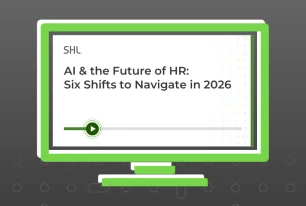AI & the Future of Work: How HR Leads the Skills Transformation
Our latest Virtual Summit explored AI’s impact on the world of work and how HR can lead the workforce through this transformation. The event featured expert insights on skill shifts and managing AI-blended teams, plus Josh Bersin on the $450B AI bet and the human advantage.
Share
AI, trust, and the new workplace
AI is rapidly reshaping both technical processes and the foundational skills needed across the workforce. What once felt distant is now commonplace, with tools like AI copilots boosting productivity for HR leaders and teams.
Our panel discussion with talent leaders from EY and DXC Technology explored these challenges. Unlike prior eras when IT led innovation, today it is HR itself driving AI adoption and governance. Panelists emphasized that HR leaders must champion trust, ensure ethical AI use, and foster employee engagement to unlock the full potential of these technologies.
“The things that we need our leaders to be focusing on is doubling down on those human skills and making sure that they are leading the organization in a way that helps people to work alongside AI.”
Justin Fallon, Talent, Performance & Career Management Director, DXC Technology
Reskilling, AI literacy, and blended teams
Panelists shared examples of how their organizations are upskilling employees, with “human” skills like curiosity, collaboration, and effective questioning now central to success. They emphasized how “AI fluency” goes beyond mere tool proficiency, it demands the ability to adapt, learn, and drive value alongside rapidly evolving technologies.
A key takeaway was that technical expertise alone will not future-proof a workforce. As AI democratizes access to information and tools, the premium is shifting to durable skills that AI can’t replace like critical thinking, communication, and learning agility. These are the capabilities that build resilience and enable the effective application of technology to real-world challenges.
This shift is also redefining career paths and mobility. The focus is moving away from tenure and traditional experiences to rapid, skill-based development and transferable capabilities. Both panelists noted that HR teams must lead by example, leaning into change and keeping pace with evolving roles with personalized coaching and development. By doing so, HR can help employees discover opportunities beyond career ladders, unlocking broader, skill-driven career agility.
The $450 billion AI bet
In his keynote, Josh Bersin offered a panoramic view of how AI is transforming organizations, jobs, and the very definition of productivity. Every major company is now urgently considering how to use AI to expand market share and improve productivity, putting HR leaders at the center of building teams prepared for future success.
With $450 billion invested in AI solutions in 2025 alone, urgent questions emerge: How will the automation of routine tasks reshape the workplace? What is the path to reskilling and the rise of the ‘Superworker’ (those enabled by AI to deliver greater impact)? And how must organizations redesign jobs to thrive in an AI-powered world?
Bersin underscored that these shifts also bring anxiety to workers. HR leaders must respond with transparency, empathy, and clear strategies to support employees whose roles will be reshaped. In this new era, HR’s responsibility is greater than ever: to balance innovation with humanity, and to ensure that AI enhances, not erodes, the workforce experience.
The human edge in an AI-powered world
Bersin emphasized that the future is not dystopian but full of possibility. He forecasted increased productivity, more autonomy, and flatter organizations. Even as automation accelerates, uniquely human skills will remain the key differentiator.
More than half of attendees in a live poll said that less than 25% of their workforce is ready to thrive in an AI-enabled world. This gap highlights HR’s critical role in preparing teams through reimagined job design, advancing smarter skills strategies, and building the resilience employees need to succeed alongside AI.
Watch the full event replay!
Watch Part 4 of SHL’s Virtual Summit now to hear the full panel discussion, Josh Bersin’s keynote and learn about our latest research where we decoded the DNA of the Superworker.









